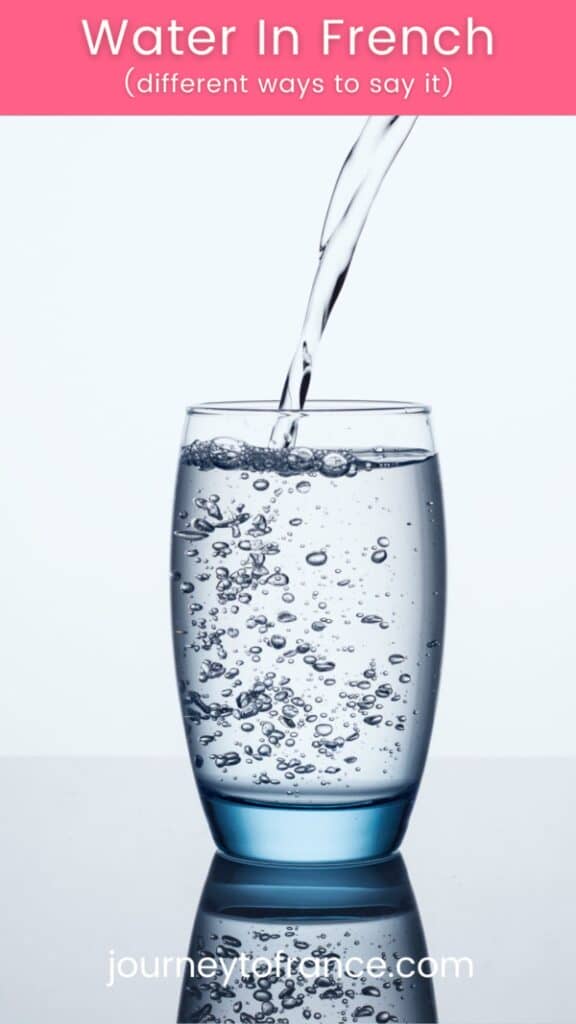Do you want to learn how to say water in French?
The French term for water is one of the first words that a beginner student of the language will learn.
Many native speakers of other languages find the spelling of the French word for water, eau, difficult to decipher. It’s just a strange set of letters that you’d wonder, how in the world do you say “eau“?
We’ll soon discover that, despite it’s peculiar speeling, it’s actually quite simple. You pronounce the word for water in French just like the French letter “O.”
Learning the term “eau” is crucial since water plays a much larger role in French culture than you may think.
However, the following lesson should make things a bit easier – by familiarizing yourself with words related to water in French.
Check out these articles for more French vocabularies:
Things you'll find in this article
Water In French

How To Pronounce “Eau” In French?
The letter /o/ is used to enunciate the word “eau.”
The tongue is repositioned further back in the mouth, the mouth is opened wider, and the lips are rounded to produce the o sound. The voice cords in your throat vibrate.
Aside from the word “eau,” which refers to water, the letters “eau” in any other French word are always pronounced as “o,” such as in the following examples:
beau – beautiful
bureau – desk
chateau – castles
How to Say Eau in a Sentence

In French, l’eau is the word for water. Since “une eau” is a feminine noun, “les eaux” refers to more than one body of water.
Saying “je veux eau” won’t get you very far. That certainly isn’t proper French. It requires either l’ or d’ as an auxiliary, depending on the context.
Be aware that when we refer to water in its own right, as in “all the water present,” we use the definite article l’.
- J’aime l’eau! – I like water!
Use D’eau is the following cases:
When the quantity is defined:
- Je voudrais un verre d’eau. – I’d like a glass of water.
With adverbs that denote quantity:
- Puis-je avoir de l’eau? – can I have some water ?
- beaucoup d’eau – a lot of
- un peu d’eau – a bit of
How to Order Water in French
Let’s imagine you’re in a restaurant (or cafe, bistro or brasserie) and you’d want to order some water. What do you say? The following are a few ways to express this request.
- Je voudrais de l’eau – I would like some water
Simply put, this is the most straightforward way of requesting water in French.
It suggests you want some water, but doesn’t specify how much or in what form. Keep in mind that sparkling water is fairly common in France, which is not the case in many other countries.
If you don’t ask for a certain kind of water, you can get sparkling water instead.
Remember this the next time you find yourself in a French restaurant and find yourself needing to place an order.
Different Types Of Water in French

Let’s talk about some other categories of water that might come up during conversations when you’re in France. Even if these are not the kinds of water you would often order in a restaurant, it is nevertheless vital to be familiar with them.
Drinking Water
- L’eau chaude – hot water
- L’eau froide – cold water
- L’eau minérale – minérale water
- L’eau purifiée / L’eau épurée – purified drinking waterL’eau distillé – distilled water
- L’eau gazeuse / L’eau pétillante – sparkling water
- L’eau de Seltz – seltzer water
- L’eau de table – table water (this is basically tap water that you can buy bottled)
- L’eau-de-vie – a clear, colorless fruit brandy (also not water, but an alcoholic beverage)
Other Kinds of Water
- L’eau bouillante – boiling water
- L’eau bénite – holy water
- L’eau douce – freshwater / soft water
- L’eau non-potable – Not-potable water
- L’eau de pluie – rainwater
- L’eau courante – running water
- L’eau tiède – room temperature water
- L’eau de rose – rosewater
- L’eau de mer / L’eau salée – sea water
- L’eau de source – spring water
- L’eau de toilette – Cheaper more diluted perfume
Other Words About Water in French

Bodies of water
- une flaque – a puddle
- une mare – a pool
- un étang – a pond
- un lac – a lake
- une mer – a sea
- un océan – an ocean
Watercourses
- un courant – a current
- un ruisseau (“un ru” if it is really small) – a brook, a stream
- une cascade – a waterfall
- une rivière, un fleuve – a river
- un canal – a canal
Take note of the fact that the term river can be translated into French in two different ways: fleuve and rivière.
Some geographers, though, use the term “fleuve” to refer to any river that empties into the ocean. There are many who reserve the term “fleuve” for only the largest rivers, such as the Seine.
“rivière” can refer to either “rivières” or “fleuves” depending on their size (bigger than streams or brooks). Thus, a “une rivière” is a larger river than a “ruisseau,” but not as large as a “fleuve.”
The French typically use the word “fleuve” for major rivers and the phrase “rivière” for medium-sized or smaller rivers. This is regardless of whether or not they empty into the ocean.

Hi, I’m Christine – a full-time traveler and career woman. Although I’m from the Philippines, my location independent career took me to over 40 countries and lived in 4 continents in the last 10 years, including France. A self-proclaimed Francophile, I love everything France.
